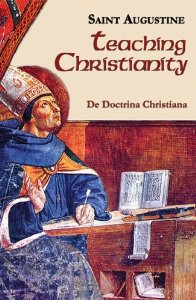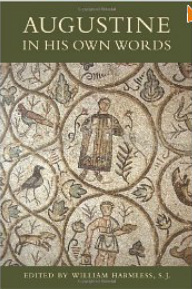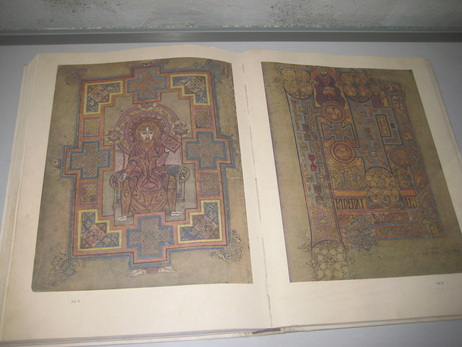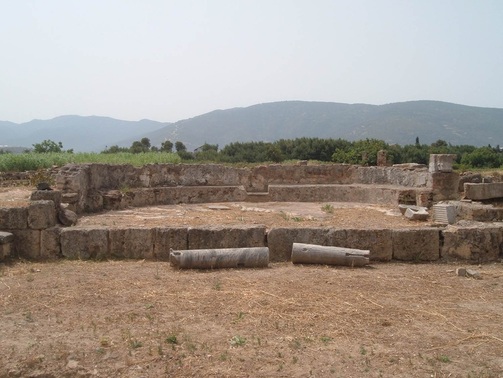posts
|
Having assigned this text to a group of students doing a summer course on Augustine, I've also enjoyed reviewing William Harmless' work--a one-volume reader that features compilations of key excerpts from Augustine's writings. The purpose of the book is to provide an single volume introduction to Augustine's works, especially those in Catholic University of America's Fathers of the Church Series. With goals similar to Augustine's Essential Sermons--an introduction to the corpus of Augustine's sermons--Augustine in His Own Words is an accessible yet rich overview of Augustine's life, ministry, and theology.
The work follows the chronology of Augustine's life and the ten chapters provide a helpful framework for Augustine's life as well as the progression of his thought: 1. Confessions 2. Augustine the Philosopher 3. Augustine the Bishop 4. Augustine the Preacher 5. Augustine the Exegete 6. Controversies (I): Against the Manichees 7. Controversies (II): Against the Donatists 8. Augustine the Theology: On the Trinity 9. Controversies (III): On the City of God, Against the Pagans 10. Controversies (IV): Against the Pelagians While one would expect to see chapters devoted to Augustine's philosophy, theology, and polemics and theology amid the Manichean, Donatist, and Pelagian issues, Harmless does a great job of putting all of this writing in the context of his day job--nearly 40 years of pastoral ministry in Hippo. So I particularly enjoyed the chapters on Augustine's work as a bishop, his preaching, and exegesis. Harmless puts each chapter itself in context with a brief introduction. Also, each excerpt begins with a brief paragraph that provides further insight to the reader. By carefully choosing these passages, the editor does a great service to first time readers of Augustine to keep them from getting bogged down. While most of the work is made up of Augustine's own writings, in some places, the works or voices of others (e.g. Jerome, Pelagius) are featured to provide further context for Augustine's thought. I especially appreciated the inclusion of Possidius who authored the Life of Augustine--a work often dismissed as unreliable hagiography by some; yet appreciated by others. An accomplished scholar, Harmless is also a really good writer and his accessible and engaging style helps the first time reader navigate Augustine. This book would be great reader for a survey of Augustine course as each chapter provides not only a taste of Augustine through excerpted primary sources, but also a rich scholarly bibliography to facilitate research in specific areas. In a sermon preached sometime between 397 and 405 (Sermon 162C in Harmless 2010:438), Augustine admonished his people to place higher value on the Scripture and its authority than on the authority of a theologian or theological position. He remarks:
Do not treat as canonical Scripture some theological debate or a book of some such debate. In the sacred writings of Scripture we learn to judge; in terms of our own writings; we are not above being judged. Certainly, what we’d choose, of the two options, is that we’d much rather speak accurately, whether in writing or in giving talks, and never make a mistake. But since this is hard to do, it is for that reason there is the firm foundation of the canon of the Scriptures . . . Let us treat the Scriptures as Scriptures, as God speaking. Let us not seek out an error-prone human being. Ultimately, all theology (reflections on Scripture for our context) are subject to Scripture itself. Scripture judges and renews theology. While elsewhere warning the Donatists against overvaluing a theologian, preacher, or church council, Augustine, aware of his own theological fan base, issued the same warning for those who may have been dazzled by his theological writings. He continues in the same sermon: If someone, therefore, reads a book of mine, he may criticize me. If I speak in a reasonable way, let him follow not me, but reason itself. If I prove something by citing some clear and divine testimony, let him follow not me, but the sacred Scripture. If, however, someone wants to criticize what I have rightly said, then he is not acting rightly; but I get more irritated with those lavishers of praise who treat my books as though a canonical text than with those who criticize my books for what’s not criticize-able. Relevant words from a late 4th/early 5th century sermon. In Teaching Christianity, Augustine conveys to his disciples, other Bible teachers, that "there are certain norms for interpreting Scripture" (preface). Within an overall hermeneutical framework, which has been reflected upon greatly by scholars, Augustine offers some basic tools for approaching Scripture. For instance, he urges Bible teachers to have a grasp of the original languages of Scripture (Hebrew and Greek), but also to be conversant with things like Bible geography, natural history, chronology, numbers, science, history, dialectics, and philosophy (Teaching Christianity, 2.11, 16).
While advocating these tools, one of the most striking aspects of Augustine's hermeneutic was the value of love. That is, the impetus for exegesis and the outcomes of it should be loving God and loving neighbor. Though not preferable, Augustine went so far as to argue that even if a passage was misinterpreted but that love resulted, then that was acceptable. He writes: Whoever, then, thinks that he understands the Holy Scriptures, or any part of them, but puts such an interpretation upon them as does not tend to build up this twofold love of God and our neighbor, does not yet understand them as he ought (Teaching Christianity, 1.36). Augustine's warning--a very relevant one for today--is clear: we have not truly understood the Bible until we have applied it in such a way that our love for God and neighbor is evident. So hermeneutics is not limited to context, genre appreciation, word studies, syntax, and exegesis, it must have life in the way of application. In short, Augustine's urges us to adopt an agape driven hermeneutic. Several years ago I had the privilege to travel to Annaba, Algeria and visit the ruins of ancient Hippo Regius where Augustine served as bishop from 395-430. One of the highlights was walking through the basilica of peace where Augustine preached thousands of sermons. Perhaps the most unique element of the church building (reflecting early church practice) was that there were no pews and the faithful stood while they listened to the sermon, which could last for up to 2 hours. On the other hand, the bishop, flanked by presbyters and deacons, sat while he preached the Scriptures. If you look front and center you will see the bishop's seat (cathedra) where the sermon was delivered.
Despite being in this central and elevated position, Augustine reminded his hearers in Sermon 301A (Harmless 2010:162), that ultimately it was Christ who taught the bishop and people alike: Now just when I speak to you from this elevated place [in the basilica], that does not mean that I am your teacher. That One--Christ--is the teacher of us all, the One whose professional chair sits above all the heavens. Under that One we come together, convening as a single school. And you and I--we are fellow students. But I'm here to advise you, just the way older students tend to do. Reading this quote reminded me of a discipleship value that I gleaned from Augustine years ago--that a mentor or teacher always remains a disciple and mentors others from the posture of being a life long learner in Christ. In Augustine as Mentor, I asserted, "Augustine demonstrated a personal commitment to growing spiritually from the time of his conversion to the end of his life. Hence, he mentored other spiritual leaders by inspiring them from his own example example and by providing a model for them to imitate. Augustine once told his congregation [Sermon 340.1] at Hippo, 'For you I am a bishop, with you I am a Christian'" (Smither 2009:222). For Augustine, while pastors and teachers mentor others, all make progress in the faith as students in the school of Christ.  In reading Augustine this week, I have been struck by his emphasis on how a teacher of the Scriptures ought to be prepared. Indeed, in his famous work Teaching Christianity (De Doctrina Christiana)--a manual for teaching Scripture--he lays out some principles for approaching and interpreting Scripture. However, Augustine seems to be first and foremost concerned that the heart of the Bible teacher be spiritually prepared for the task of exegesis. He writes: First of all, then, it is necessary that we should be led by the fear of God to seek the knowledge of His will, what He commands us to desire and what to avoid. Now this fear will of necessity excite in us the thought of our mortality and of the death that is before us, and crucify all the motions of pride as if our flesh were nailed to the tree. Next it is necessary to have our hearts subdued by piety, and not to run in the face of Holy Scripture, whether when understood it strikes at some of our sins, or, when not understood, we feel as if we could be wiser and give better commands ourselves. We must rather think and believe that whatever is there written, even though it be hidden, is better and truer than anything we could devise by our own wisdom (Augustine, Teaching Christianity, 2.7.9). While one must approach the study of Scripture with piety, Augustine asserts that preachers should also be spiritually prepared in order to communicate the Word. He adds: In praying for himself and for those he is about to address, the preacher should be a person of prayer before he is a speaker of words. As the hour when he is to speak approaches, before he uses his tongue, he should raise his parched soul to God that he may gush forth what he has drunk in and pour out what has filled him up (Augustine, Teaching Christianity, 4.15.32 in Harmless 2010:126). To be sure, for Augustine, the process of studying and communicating Scripture was a great spiritual exercise; not merely a rational one or that was based on self-reliant skill. |
Archives
November 2023
|




 RSS Feed
RSS Feed
